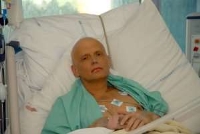Radiation found at German location ex-spy's contact visited before meeting
German authorities said they found traces of the rare radioactive substance polonium-210 at an apartment visited by a contact of fatally poisoned ex-spy Alexander Litvinenko before the two men met in London.

Prosecutors left open whether Russian businessman Dmitry Kovtun might have been involved in Litvinenko's death. However, they said they were investigating him on suspicion that he may have improperly handled radioactive material.
Investigators said Kovtun flew to Hamburg from Moscow with Aeroflot on Oct. 28 and departed for London on Nov. 1. That is the day when Kovtun and at least one other Russian met with Litvinenko at London's Millennium Hotel and when Litvinenko is believed to have fallen ill.
Litvinenko an ex-Russian agent who was a fierce Kremlin critic died Nov. 23 of poisoning from polonium-210 after blaming Russian President Vladimir Putin, also a former intelligence officer, for the poisoning.
The Kremlin has vehemently denied involvement.
Kovtun visited his ex-wife's Hamburg apartment the night before he headed to London and met Litvinenko, German investigators said Sunday.
Tests on traces of radiation at the apartment "clearly show that it is polonium-210," Gerald Kirchner of the Federal Radiation Protection agency said at a news conference Sunday.
The substance was found on a couch where Kovtun is believed to have slept at the apartment.
Traces of radiation also were found in the passenger seat of the BMW car that picked Kovtun up from the Hamburg airport; on a document Kovtun brought to Hamburg immigration authorities; and at the home of Kovtun's ex-mother-in-law outside Hamburg all from before the Nov. 1 meeting.
Kovtun reportedly is being treated in Moscow for radiation poisoning. Russian authorities, calling it attempted murder, have opened a criminal investigation into his poisoning, reports AP.
Prosecutor Martin Koehnke said an investigation of Kovtun on suspicion of improper handling of radioactive material was opened because "at this stage of the investigation, we have sufficient initial cause to believe that he brought the polonium traces to Hamburg outside his body, or that these traces are the result of contact with polonium-210."
Officials said that any connection between Kovtun and Litvinenko's death would have to be investigated by British police rather than by the Hamburg police task force, codenamed "The Third Man" in an apparent reference to the 1949 film about a mysterious death in postwar Vienna.
"We still believe that both variants are possible: that he may be a victim, but also that he may have been involved, at least in procuring the polonium," Koehnke said.
Kirchner, the radiation agency official, said it was possible Kovtun could already have been poisoned and that he left behind traces through body fluids such as sweat.
Whatever his role, at this point, "we have to assume that Mr. Kovtun already had this polonium-210 contamination on him when he came to Hamburg Oct. 28 on a flight from Moscow," police investigator Thomas Menzel said on ARD television.
On Saturday, the German plane aboard which Kovtun flew from Hamburg to London tested negative for polonium-210. Investigators raised the possibility that that may be because the plane had been cleaned thoroughly.
A security officer for Moscow's Sheremetyevo airport said all Aeroflot planes, including the one which flew to Hamburg on Oct. 28, had been checked for radiation and tested negative. The officer spoke on condition of anonymity because he wasn't authorized to speak to the media.
Litvinenko met at the Millennium Hotel in London's Mayfair neighborhood with Kovtun and former Soviet agent Andrei Lugovoi. Another man, security firm head Vyacheslav Sokolenko, has said he was at the hotel but did not participate in the meeting.
Lugovoi has denied that the men were involved in the ex-spy's death.
Lugovoi, Kovtun and Sokolenko all graduated from an elite military academy in Moscow. Their fathers were Soviet officers who served together at the Defense Ministry, and they went to the same military academy. Kovtun has said he graduated in 1986, a year ahead of Lugovoi.
Speaking on Ekho Moskvy radio Nov. 24, Kovtun said he served in Czechoslovakia and Germany, remained in Germany after the Soviet collapse in 1991 and lived there for 12 years. He said he was married until recently to a German citizen and still had residency status in Germany.
He said his business dealings are now in Russia as a consultant for Western companies looking to do business there.
Lugovoi said Sunday that Kovtun was in "satisfactory" condition. "He's not in a coma" as has been reported, Lugovoi told Russia's RIA Novosti news agency.
The Interfax news agency had reported Thursday that Kovtun slipped into a coma after being questioned by Russian investigators and Scotland Yard detectives. Lugovoi has dismissed the report as "lies."
Subscribe to Pravda.Ru Telegram channel, Facebook, RSS!


